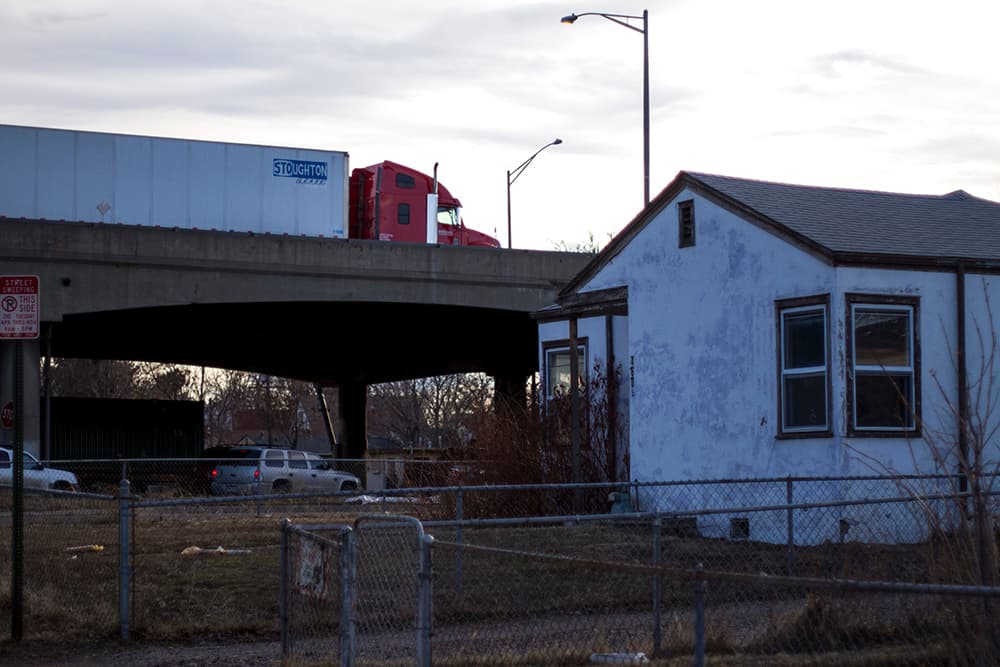The construction company that is rebuilding Interstate 70 wants permission to run drills, excavators, dump trucks, bulldozers, cranes, jackhammers and generators at night for the next five years.
The proposal drew immediate backlash from some neighborhoods around the highway, where people already worry about the noise, pollution and traffic that the project will bring.
"There’s no other place in the state where you can find a highway as close to homes as you can there. You can jump off of the highway ... onto someone’s roof," said Candi CdeBaca, a neighborhood advocate and city council candidate. The disruption is "unreasonable" for the community, she said.
The company running the project, Kiewit Meridiam Partners, argues that nighttime construction will get the job done faster. Kiewit representatives also say that nighttime construction will be safer and more efficient because traffic is lighter.
"We really need to work at night so we can do this job faster and reduce the impacts of this project, but we are very cognizant of the neighborhoods and their concerns, and are working really hard to find resolution that is acceptable," said Hunter Sydnor, a spokesperson for Kiewit.
So far, city staff seem to support the idea.
A letter from the Department of Public Health & Environment suggests approval of a variance to city noise rules, as long as Kiewit tries to limit the noise.
But Council President Albus Brooks, whose district includes much of the elevated highway section, is asking for a delay. He thinks nighttime work is necessary, but he wants to see a more community-oriented planning process.
"We feel like it’s a ridiculous proposal," he said. "We know that we don’t make the decision on this, but we’re trying to set some standards here, because we're incredibly fearful of the impact that you're going to have on the neighborhood if you’re just going 24 hours without any kind of plans to mitigate impacts."
What exactly are they requesting?
Denver's laws say that construction crews have to stay under a certain noise level. For residential areas at night, that level is 50 dBA -- similar to the sound of heavy traffic from 100 yards away. (That's according to California's transportation department.)
Denver officials have recommended that the limit be raised for Kiewit. The new maximum would be 75 dBA for a measure of average sound levels and 86 dBA for a measure of maximum levels.
For reference, 75 dBA is like a busy urban area in the daytime, while 86 dBA is like a garbage disposal from 3 feet away. Those sound levels will be recorded from the edge of the nearest residence or other relevant property.
Sydnor couldn't say how often nighttime work would happen, but it would be pretty regular. Kiewit plans to build walls, lay asphalt, drill shafts, scrape surfaces and erect and demolish bridges at night.
They would have to take some protective steps.
City staff have suggested various strategies to cut down on noise.
Generally, construction won't be allowed to happen near residential areas and hotels for more than five nights in a row, with two-day breaks in between. The loudest activities will run for three days with four-day breaks.
In some areas, Kiewit would have to book hotels and provide transportation for residents above certain noise levels. And the crews will have to use temporary or permanent sound barriers to cut nighttime noise.
The city also is asking Kiewit to use quiet generators and to keep trucks off residential streets when possible, among other conditions. Kiewit will try to keep the noise down by doing research ahead of time and then monitoring sound levels in the field, Sydnor said.
Kiewit also would have to open a 24-7, bilingual hotline for noise complaints, and it would designate someone who can shut down construction to correct complaints.
Rebecca White, a spokesperson for CDOT, said that Kiewit's request for I-70 closely matches the nighttime work it did during the TREX reconstruction of Interstate 25 through Washington Park.
What's next?
The city's Board of Public Health and Environment will consider the request at 5:30 p.m. Thursday, July 12, at 200 W. 14th Ave. on the second floor.
Brooks wants Kiewit to change its request. He wants it shortened from five and a half years to four years, since the project is supposed to be "substantially complete" by 2022. (Sydnor said that Kiewit plans to be done by 2022, but it wanted to leave itself extra time.)
Brooks also wants to see quarterly community check-ins to ensure that the noise is being dealt with properly.
CdeBaca, who is running against Brooks for city council, says the request is proof that the entire project should be reconsidered. She and others want to see the highway routed out of north Denver and replaced with a boulevard.
I-70 cut through low-income and Latino neighborhoods in Denver when it was built in the 1960s, bringing noise and pollution with it. For CdeBaca, the nighttime construction proposal is another burden for a community that already lives with the fallout of Denver's industry and infrastructure.
"Now is the right time to stop this train while we still can and consider an alternative," CdeBaca said. "We brought this up a long time ago and now it’s actually happening. We didn't know. They didn't tell us that they were going to be doing 24-hour construction."
If approved, nighttime construction could begin this month. The request is for the length of the project through Denver, stretching east from I-25.
Check out our previous coverage of how and where to expect construction pain.












